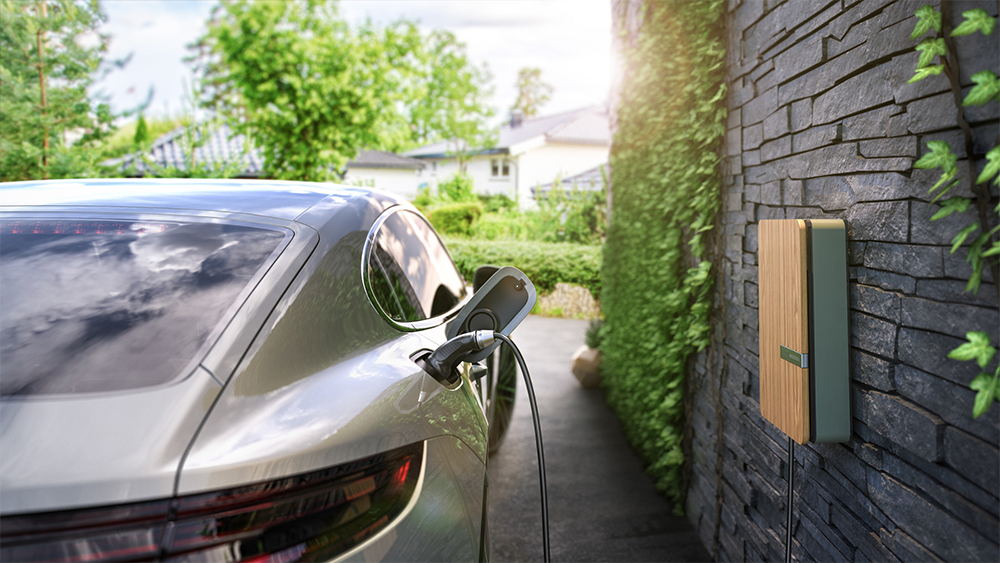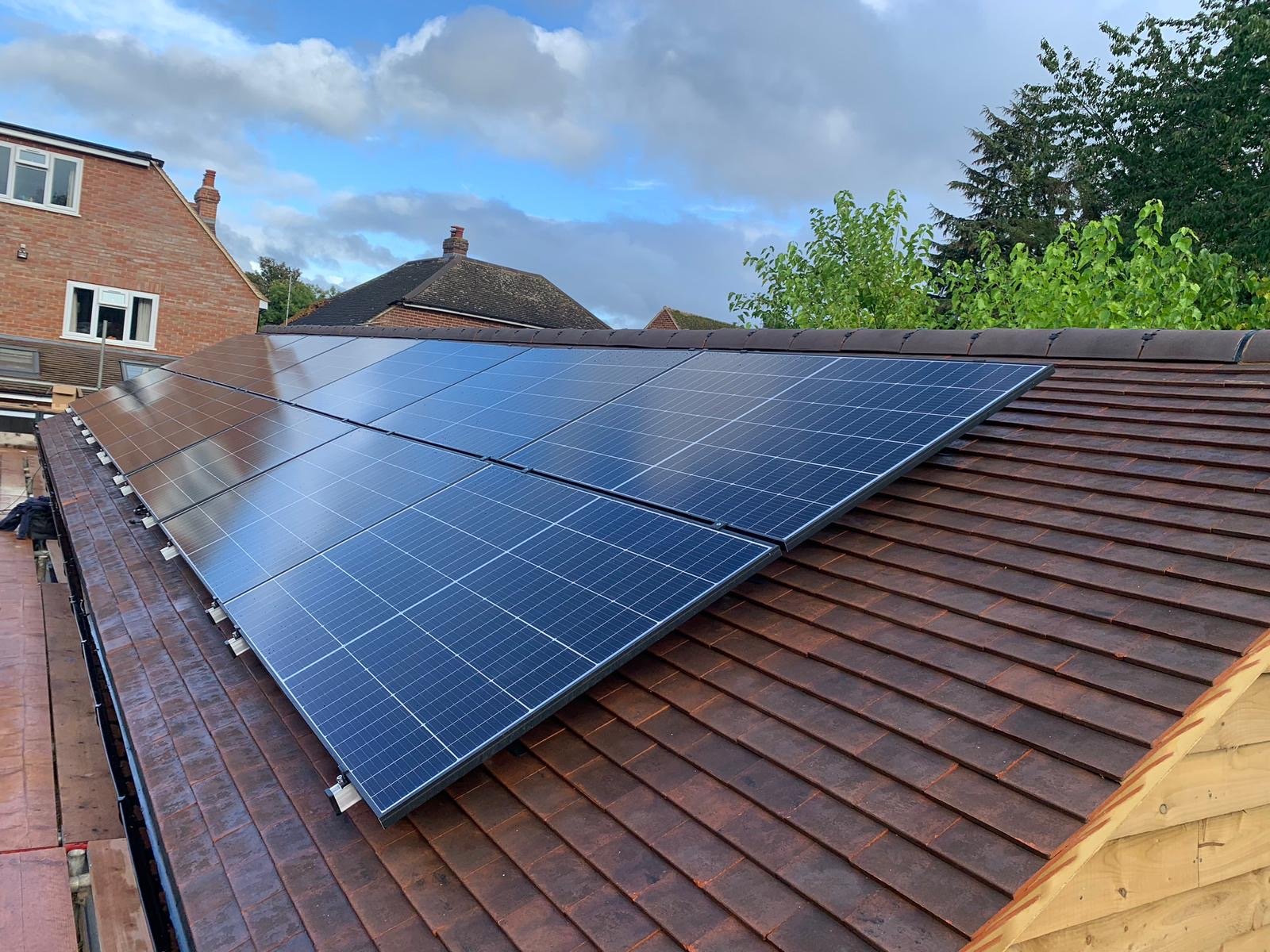Domestic Solar Energy
Our experienced in-house team of engineers use the leading solar PV systems on the market to design and install the best solar solution for you based on your energy needs and budget.
Are you ready to embrace a sustainable future by investing in a domestic solar PV system? Not only will you be drastically cutting your energy bills, but you'll also be making a significant contribution to a cleaner environment.
For more details on how to switch to solar, please contact us for a quote today.
Domestic Solar PV System
Solar Panels: We use high-efficiency monocrystalline panels. Each panel is rigorously tested to withstand harsh weather conditions and deliver long-lasting energy production.
Inverter Technology: Our systems include state-of-the-art inverters that convert direct current (DC) from the panels into alternating current (AC), usable in your home.
System Capacity: Ranging from small 3kW systems, suitable for average-sized homes, to larger 10kW systems designed for extensive energy needs.
Energy Output: A typical 5kW system can produce approximately 4,500 to 6,000 kilowatt-hours (kWh) per year, depending on location and solar exposure.
Installation: Our inhouse MCS certified engineers ensure optimal alignment and secure mounting for maximum energy capture.
Transform your Energy Use
The lifetime cost per kWh from commercial solar PV systems, can be as low as 4p per kWh, while electricity from the grid currently costs approximately 24.5p per kWh . Our solar solutions offer homeowners a sustainable way to generate electricity, with systems designed to meet specific household needs.
-

Reduced Energy Bills
We can help you significantly reduce your monthly electricity bills by up to 80%, by designing the right system for your energy usage.
-

Return on Investment
Your ROI can be seen within 5-7 years as system payback periods have shortened with improvements in technology and reductions in cost.
-

Government Incentives
We can advise you on government incentives, such as feed-in tariffs or tax credits, plus 0% VAT on solar batteries, further enhancing the economic return.
-

Sustainability Goals
Our solar PV solutions will help a typical home system reduces carbon emissions by approximately 1.3 to 1.6 tonnes annually.
How to make solar energy work harder
As you’ve read, solar panels are a great investment for the future and can help to significantly reduce your energy bills. The following options offer even greater sustainability so you are then not reliant on the grid. We can help you integrate your solar panel system into your smart home controls to easily manage your energy usage, heating, lighting and EV car charging.
-

Electric Vehicle Chargers
Install a solar panel system and power your electric vehicle charger, which essentially means you are charging your car directly from the sun for free.
-

Heating Hot Water
For a small additional upgrade, any excess energy produced by a solar PV panel can be diverted to power your domestic hot water immersion heater.
-

Powering Heat Pumps
Solar panels are often chosen alongside heat pump technology as it offers an excellent low carbon heating combination, and is less reliant on fossil fuels.
Are solar panels for homes worth it?
But when it comes to buying solar panels the big question is how much money will you save and what’s the Return on Investment!
We have asked our customers living with home solar panels how much money they have saved over the last 12 months.
Solar energy case study
We installed three devices as part of our client’s solar solution to help them harness as much of the power generated as possible:
16 solar panel system with inverter
A battery providing 10kWh of storage for all their evening and night time energy use
An EV charger set to charge from surplus solar energy or off-peak tariffs
A smart immersion heater to power the hot water tank with surplus solar energy during the day to save on the gas bill
Based on the savings made over the first 12 months the client’s Return on Investment was approximately 6 years.
Our Latest Domestic Solar Energy Projects
-

Brackley Solar
Location: Bicester
Solar panels: 14 Jinko Tiger
Inverter: Huawei 6kW L1 HV 1ph
Battery: Huawei LUNA 5kWh
EV Charger: Myenergi Zappi V2.1 7kW
-

Towcester Solar
Location: Towcester
System Size: 10 kWh system
Solar panels: 24 panels
Inverter: Huawei 10 kWh
Battery: 10 kWh
-

Princes Risborough Solar
Location: Princes Risborough
System Size: 11.9 kWh system
Solar panels: 28 x 425w Trina Vertex
Inverters: 2 x Solax X1 G4 7.5 kWh
Battery: 11.6 kWh
Solar Panel FAQs
-
There's help available to get solar panels installed in your home, but you usually need to be on certain benefits or have a low income to be eligible. What each scheme offers, and its eligibility criteria varies:
The Energy Company Obligation (ECO) scheme
Home Upgrade Grant
Warmer Home Nest Scheme Wales
Home Energy Scotland Grants and Loans
Under the ECO4 scheme, eligible homeowners or private tenants who receive an income-based benefit and whose property is deemed non-efficient (EPC RATING E-G) may be eligible for free Solar Panel installation which can help you generate your own electricity and save up to 70% on your energy bills.
Also, the Smart Export Guarantee (SEG) scheme allows all homeowners with Solar Panels installed (up to 5MW capacity), to receive payment for selling surplus energy back to the grid.
-
South-facing rooftops, benefit the most from a solar panel installation, as they are exposed to sunlight for the longest period of time. They also see the sun when it’s at its highest intensity, meaning that solar panels on a south-facing roof will generate the most solar energy. However, this doesn’t mean if your roof faces another direction you still wouldn’t benefit from having solar panels installed.
East and West-facing roofs are also suitable for solar panels and will still see a good deal of green energy generation throughout the course of the day. East or West facing installations only tend to lose around 15% of generation.
It is only North-facing roofs that are completely not recommended. This also doesn’t mean you can’t install a PV system if you have a flat roof. In fact, flat roofs are often ideal as they allow for a more flexible design. This is because installers can use mounts to angle the Solar Panels at the optimal angle. If in doubt, just get in touch and our design team can carry out a home visit for a survey of your roof.
-
Not everyone’s home or business is suitable for Solar. Your suitability for Solar Panels depends on four factors:
Your current electricity consumption.
The Pitch, Orientation and Space available on your roof.
If there is any shading.
The irradiance level of your location.
To find out if your property is eligible for solar get in touch! One of our Solar experts will be able to help advise you.
-
In most instances, planning permission isn’t required when installing Solar Panels, as they are classified as “Permitted Developments” (PD). However, in order for Solar Panels to classify as PD they must meet the following requirements:
The Solar Panels must not be installed above the highest point of the property (not including chimneys).
They must be installed in a way that makes the least visual impact to the property and surrounding area.
The Solar Panels must not protrude more than 200mm from the surface of your roof.
If your property is a listed building or located within a conversation area, it is likely that planning permission will be required. One of our Solar experts will be able to advise you if you are unsure.
-
Mono-crystalline: Mono-crystalline Solar panels are seen as the more premium panel, due to their high efficiency and darker/black appearance. A Mono-crystalline solar panel is made up of single-crystal silicon, meaning that the electron can generate more electricity as they can flow more freely. As they use the highest purity of silicon they are more efficient, with a higher power output than polycrystalline panels.
Polycrystalline: Polycrystalline solar panels alternatively have a lower efficiency, at a more affordable price point. The Solar Panels are made up of fragments of silicon crystal that have been melted together to make wafers and are mostly recognised by their blue-speckled finish.

Next Steps
-
Get in touch
Contact us today to book your free consultation with one of our PV experts to answer any questions you may have and to discuss your PV solar project.
-
Free quote
One of our experts will visit your property to discuss all things solar, before creating a bespoke tailor-made quote and virtual design for your property.
-
Installation
Your PV solar system installation can be completed within a week. The system is fully tested by our own electricians and they will issue a completion certificate.
-
Free energy
Once your panels are installed our engineers will help you set up the App and show you how to you can start enjoying your energy savings.


